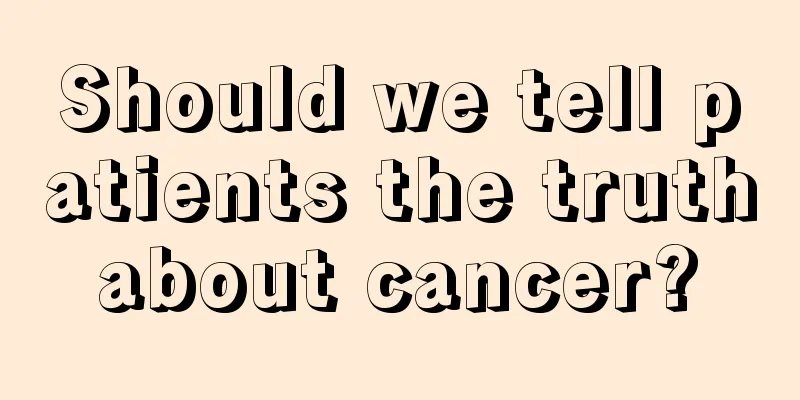Should we tell patients the truth about cancer?

|
In the outpatient or inpatient department of the oncology department of a hospital, some family members of cancer patients often come to the attending physician and head nurse without the knowledge of the patient while the patient is undergoing treatment, asking the doctors and nurses to keep the patient's condition confidential and not disclose the condition. This situation often occurs in the oncology department. Most family members of cancer patients will conceal the true condition of the patient, believing that concealing the condition from the patient is more conducive to maintaining the patient's quality of life and cancer treatment. The right to informed consent is a basic right of patients. Obviously, the practice of concealing the condition is in conflict with the basic rights of patients. Therefore, whether or not cancer patients should be informed of their condition has become a controversial topic. According to media reports, about 70% of Chinese cancer patients have their family members hiding their illness. In fact, it is neither legal nor in line with the subjective wishes of most patients for family members to hide their illness from cancer patients. It may increase the psychological burden of patients and even have a negative impact on treatment. So, should we tell cancer patients the truth? As a doctor, I generally support telling the patient the truth and am willing to communicate directly with the patient and explain the true situation of the disease to the patient. In fact, as far as current medical treatment is concerned, cancer does not really mean death. Many mentally healthy cancer patients are more able to withstand bad news than people expect. For the vast majority of patients, it is still necessary to tell the truth. How should I inform you? Doctors suggest that the gradual disclosure method can be chosen, which is helpful for the diagnosis and treatment process of the disease and can maximize the treatment effect. Because through gradual disclosure, patients can have a clearer understanding of their own situation, have a more scientific and rational thinking about their current situation, and can cooperate with the medical staff's diagnosis and treatment opinions and measures. First, we can inform the patient that there is a lesion, a lump or a new growth in the corresponding part of the body and that hospitalization is required for further examination to confirm the diagnosis. This will allow the patient to accept that he is ill and agree to hospitalization. At this time, the patient's family members should also adjust their emotions and mentality, because family members are the people the patient contacts most often, and their psychological expressions will directly affect the patient's emotions and thoughts, thereby affecting the treatment process and effect. Second, after a period of time, the patient is informed that he or she has a disease, but further diagnosis is needed to determine whether the disease is benign or malignant, and that both can be treated. During this process, family members can provide psychological counseling and suggestions when interacting with the patient. For example, they can collect some medical information to give the patient a clear understanding of the current medical level and cancer, so that the patient does not blindly believe or deny it. They can also show some photos of the family's harmony and happiness, and talk more about the patient's health, so that the patient can feel the power of love accompanying him or her, and develop a positive attitude to recover health. 3. After some time, after this series of preparations, you can choose a suitable opportunity to inform the patient that he has cancer, but it is not in the advanced stage and can achieve satisfactory results through treatment. At this time, the family members should act as a harmonious bridge between the doctor and the patient, listen carefully to the doctor's notification and explanation of the condition, and actively cooperate with the diagnosis and treatment measures issued by the doctor, and strive to build a trusting and harmonious relationship between the doctor and the patient. 4. Some patients with serious conditions do not have hope of recovery and can only rely on treatment to delay their final days. For such patients, if their condition is concealed from them at the beginning, as their condition worsens, they will feel it themselves, and will doubt the hospital's treatment, or even feel dissatisfied with the treatment. This negative emotion will be more detrimental to their treatment. For such patients, if conditions permit, it is recommended to tell the truth at the beginning of treatment, so that they can face reality calmly and alleviate the fear of death. After all, for patients, they have the right to decide how to spend the rest of their lives, and we should give them time to make up for the regrets in their lives. |
<<: These symptoms in women may be a sign of "cervical cancer"
>>: Which organ in the human body is the most tired? Many people don't know...
Recommend
What to do if pituitary tumor recurs
Pituitary tumor is a common tumor disease and sho...
Exercise therapy for pre-stage lymphoma
Cancer treatment is a long process. In order to t...
Does dilating mydriasis hurt the eyes?
Mydriasis is a medication-based treatment for chi...
CT features of small cell lung cancer
The CT features of small cell lung cancer usually...
What are the Chinese patent medicines that can replenish qi, strengthen the spleen and eliminate dampness?
The first thing everyone does when they are born ...
How to treat weekend anxiety?
Nowadays, with the increasing pressure of society...
Can bamboo charcoal bags absorb formaldehyde?
Formaldehyde is very harmful to the human body, b...
What tests should be done for prostate cancer? A brief introduction to the four major test methods
Young and middle-aged men may most often suffer f...
10 groups of people who are prone to breast cancer
Breast cancer is the leading cause of death and h...
Can you eat ripe bananas?
Most of the bananas we eat are raw. This is becau...
What should I do if my knee meniscus degeneration occurs?
As people age, the meniscus of most people will d...
What should I do if my heels rub my feet?
Many girls feel wonderful after buying a pair of ...
Will gallbladder polyps cause abdominal pain?
The symptoms of most gallbladder polyps are simil...
Four major types of prostate cancer
Prostate cancer (PCa) is the most common malignan...
Symptoms and precautions of nasopharyngeal cancer
What are the symptoms and precautions of nasophar...









